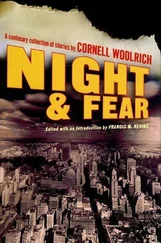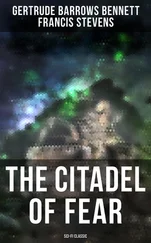Francis Stevens - Citadel of Fear
Здесь есть возможность читать онлайн «Francis Stevens - Citadel of Fear» весь текст электронной книги совершенно бесплатно (целиком полную версию без сокращений). В некоторых случаях можно слушать аудио, скачать через торрент в формате fb2 и присутствует краткое содержание. Жанр: Фантастика и фэнтези, Прочие приключения, на английском языке. Описание произведения, (предисловие) а так же отзывы посетителей доступны на портале библиотеки ЛибКат.
- Название:Citadel of Fear
- Автор:
- Жанр:
- Год:неизвестен
- ISBN:нет данных
- Рейтинг книги:5 / 5. Голосов: 1
-
Избранное:Добавить в избранное
- Отзывы:
-
Ваша оценка:
- 100
- 1
- 2
- 3
- 4
- 5
Citadel of Fear: краткое содержание, описание и аннотация
Предлагаем к чтению аннотацию, описание, краткое содержание или предисловие (зависит от того, что написал сам автор книги «Citadel of Fear»). Если вы не нашли необходимую информацию о книге — напишите в комментариях, мы постараемся отыскать её.
Citadel of Fear — читать онлайн бесплатно полную книгу (весь текст) целиком
Ниже представлен текст книги, разбитый по страницам. Система сохранения места последней прочитанной страницы, позволяет с удобством читать онлайн бесплатно книгу «Citadel of Fear», без необходимости каждый раз заново искать на чём Вы остановились. Поставьте закладку, и сможете в любой момент перейти на страницу, на которой закончили чтение.
Интервал:
Закладка:
The maid's defection, however, was followed an hour later by a more serious interruption to household affairs. The phone rang and a woman's voice asked for Mr. David King. Cliona sent the cook to look for David, who, besides being gardener and garage-man was, ex officio , the cook's husband. A few minutes later he was at the telephone, from which he turned with a very white face.
"What is it, David? Has anything happened?"
"Mrs. Rhodes — " The man stopped, took a deep breath and continued. "It's my son, George. That-that woman on the phone is a nurse at the City Hospital, ma'am. He has fell off a pole, and-he's bad hurt she says — "
He was interrupted by a scream, as Marjory, the cook, fairly flung her husband aside and grasped at the receiver; but the other party had hung up.
Cliona had intervened.
"Never mind the phone. David, get your hat. You've just three minutes to catch the four-fifteen-there's the whistle now! Run, David! Marjory, you may take the next train if you like."
For she well knew how dear to the couple was their son, who was a hard-working young wireman in the employ of an electrical contractor.
David did run and caught the train, for the Carpentier station was almost at the foot of the hill which the bungalow crowned. Then Cliona had her hands full in offering what solace she might to her stricken cook.
There was another train at six, and in the meantime David called up, urging his wife to take it and come. He was alarmingly indefinite, but the very fact that the hospital authorities had suggested that the boy's mother be sent for told its own story.
Marjory King, good soul, able to consider another even in the midst of grief, urged her young mistress to accompany her and spend the night in town. The bungalow was too lonely. But Cliona hurried her off, assuring her that if she felt in the least nervous she could go and beg the hospitality of a neighbor. As a matter of fact, being as yet only slightly acquainted in the locality, she intended doing nothing of the sort.
Left alone, she reflected for a time on the sadness of losing an only son, thanked her stars in innocent selfishness that the hurt man was neither her husband nor brother, and proceeded to get her own supper.
By the time the dishes were cleared away and washed it was after eight and quite dark. Having first turned on all the lights in the front of the house, Cliona seated herself in the living-room beside Rhodes' own particular table with its brown-shaded reading lamp, and took up the knitting on which she was then engaged.
The living room was itself of a comforting and companionable appearance. Even alone in it, Cliona had a pleasant sense that its walls offered a sort of conscious protection.
Not that she was really nervous, but this was her first experience of that queer feeling of emptiness that pervades a house at night when deserted by all its customary occupants except one. And the bungalow was entirely isolated, in a practical sense, standing as it did among trees at the summit of a quite high hill. Until one came close to it, it could not even be seen.
About ten o'clock she rose, put away her work, and went through the house making sure that doors and windows were secure and the burglar-alarm system, so far as she could determine, properly set.
Outside the night was very still, frosted white by the radiance of a brilliant moon.
On an impulse she passed through the enclosed veranda, opened the door and stepped out. The air was pleasant, neither cold nor warm, and scented with the breath of flowers.
Slowly she walked around the house, Snookums, her bulldog, bouncing and wriggling before her. In the black shade of the trees the dog was a white shadow, but in the general paleness where the moon struck full he seemed almost to disappear. Indeed, it was as if only the ink-black shadows preserved the world from melting into invisibility. The open meadows overlooked by the hill were pale, wide pools of light.
On the path beneath Cliona's feet the moon, peering through foliage, wrought embroideries of black and white more intricate than any needle had ever traced.
The night was absolutely still-so still that the gentle ripple of water reached her ears from Llewellyn Creek, flowing past the foot of the hill.
Presently a little wind came and shook the branches over Cliona's head with a sound strangely startling and mysterious, like feet running through the night far away.
It is true that there was a great peace upon the world, but it was a peace too coldly colored for Cliona's lonely ease. There was nothing human in it. When she presently returned into the bungalow, she was glad of its friendly walls and kindly rooms.
Having put Snookums in the kitchen and half reluctantly turned out the lights, she retired to her bedroom which, with three others, opened directly off the living-room. The servants' empty quarters were located in a small wing leading by a passage to the kitchen.
Shutting and locking her door, she began to brush her hair. And then at last the loneliness that had been creeping up on her all evening made its final spring. Cliona stopped suddenly, brush poised in the. air. What if-what if —
"Well, what if what?" she demanded aloud, staring at her mirrored reflection as if expecting a reply. "Cliona O'Hara Rhodes, shame upon you for a little, sniveling coward! What is it you're afraid of? Tell me that now."
The reflection looked back with big, indignant eyes. But the indignation was a sham, roused there to hide a less comfortable emotion, and well she knew it.
Unlocking her door, she went to the kitchen and called Snookums, who bounded joyfully from his basket in the corner and dashed ahead of her. On returning through the living-room, Cliona caught up a small, brightly colored object in passing, and with a whimsical smile set it beside Rhodes' automatic pistol on the table by her bed. Let it represent the giver, in whose protecting strength she had such perfect faith.
So the eyes of that little "heathen god" Quetzalcoatl, lord of the air, looked benignantly on as Cliona said her orisons before the shrine of another faith.
Snookums had been "put to bed" on the rug, but once his mistress had definitely retired he improved on the arrangement by jumping on the bed itself and curling up over her feet. Twice she put him off, then yielded to the pup's particular form of bulldog tenacity and let him remain.
The house was very empty-she could feel it even through her closed door-and the warmth of the small, live body through the sheet was comforting. Because she knew her nervousness to be mere folly, Cliona drifted off to sleep at last.
And all outdoors was drenched in its pallid moon bath.
At the foot of the hill Llewellyn Creek ran ripples of ebony and white fire, and where at one point there was a wide slope of treeless lawn, it was as if the turf were powdered with snow.
The natural voice of the creek became merged with a distant splashing. That second sound grew louder-nearer. Presently from the little stream something came out and up-something almost invisible in that false lucidity of moonlight.
Crossing the unshaded turf it was a vague largeness, wallowing clumsily upward. In the black shade of the trees it was a white shadow-a white, frightful shadow, too terrible for the right to existence, even in a bad dream.
Cliona's sleep was untroubled by dreams, bad or good, but from it she was awakened by a frantic sound of barking, and realized that Snookums was bouncing about on the bed like a pup gone mad. He was tugging at the sheet with his teeth, and making racket enough for a dog twice his size.
Roused to that temporary superwakefulness which follows such a nightalarm, Cliona sat up. There was in her mind a notion, too, that the pup's barking had been preceded by some other and far different sound.
Читать дальшеИнтервал:
Закладка:
Похожие книги на «Citadel of Fear»
Представляем Вашему вниманию похожие книги на «Citadel of Fear» списком для выбора. Мы отобрали схожую по названию и смыслу литературу в надежде предоставить читателям больше вариантов отыскать новые, интересные, ещё непрочитанные произведения.
Обсуждение, отзывы о книге «Citadel of Fear» и просто собственные мнения читателей. Оставьте ваши комментарии, напишите, что Вы думаете о произведении, его смысле или главных героях. Укажите что конкретно понравилось, а что нет, и почему Вы так считаете.












